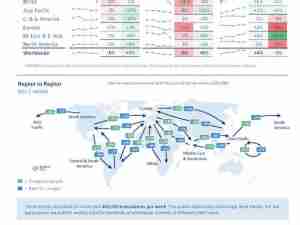The European Commission says it plans to fast track the Single European Sky package as part of new proposals for managing risk from volcanic activity.
Michael Steen, Chair of TIACA's Industry Affairs Committee, said: 'The EU is absolutely correct to see a Single European Sky with a single regulator as one of the ways to cope with removing bottlenecks from the air transport system in response to such a crisis in the future. It would, as the EU has stated, mean a much faster, coordinated response that would ease the disruption to passengers as well as businesses that rely on the speed and predictability of air cargo and help to reduce the substantial losses suffered by businesses.
'TIACA is also pressing for the modernization of current air traffic management systems, many of which are based on procedures that were developed in the 1950s. Many of the ground rules for the present procedures are no longer valid as new technologies are available that can ease congestion in our skies and produce significant environmental benefits. Unlike the first generation of modern aircraft, introduced over five decades ago, modern commercial airplanes are designed to determine their positions with pinpoint accuracy. In fact, new airplanes can determine their position to within less than a meter.
'New methods for gathering and sharing data and cutting edge systems for trajectory calculation, coupled with upgraded airport infrastructure and other tools on the ground and in the air, allow for more efficient management of air traffic while maintaining and even enhancing safety levels. In other words, when fully implemented, they safely allow more aircraft to fly more closely together on more direct routes, reducing delays, and providing unprecedented benefits for the environment and the economy through reductions in carbon emissions, fuel consumption, and noise.'
Modernization of air traffic management (ATM) systems can be a major factor in reducing aviation CO2 emissions. If the aviation industry can reduce every flight's duration by just one minute, it would prevent 4.8 million tons of CO2 emissions each year.
Michael Steen added: 'Improvements to the ATM system need to take advantage of the advancements made in airplane capabilities, precision data, communications and network sharing technologies. ATM modernization is a complex issue requiring the active collaboration of many stakeholders and its success relies upon global harmonization of systems and operations. TIACA therefore urges governments to dedicate the necessary resources to modernize their air traffic management systems, and further urges governments to ensure that their approach to ATM systems be global in nature and reflect harmonized standards.'






